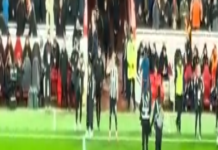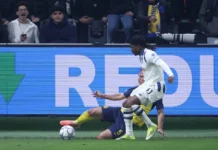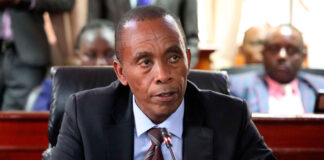The top scorer at the African Cup of Nations five months ago, Emilio Nsue, never was eligible to play for Equatorial Guinea throughout his entire 11-year international career, FIFA judges ruled.
FIFA has published a detailed verdict to explain why its disciplinary committee last month stripped two wins from Equatorial Guinea in qualifying games for the 2026 World Cup that were played in November.
In both games, the 34-year-old Nsue scored in 1-0 wins over Namibia and Liberia yet he never had formal FIFA approval to switch from Spain to Equatorial Guinea. Nsue represented Spain age-group teams, including at an Under-21 European Championship.
He has been banned by FIFA for six months from national team games.
It was a repeat judgment of FIFA disciplinary verdicts in 2013 that also ordered Equatorial Guinea to default two qualifying games for the 2014 World Cup as 3-0 losses because Nsue was ineligible.
FIFA said its disciplinary judges in the most recent investigation confirmed the reason from the cases relating to the 2013 games.
Nsue “apparently only acquired the Equatoguinean nationality (March 2013) after having played in his first international match in an official competition” with Spain, the FIFA judges wrote in their judgment.
The player had in fact played 26 games for Spain teams from under-16 to under-21 levels across six years through 2011, including at finals tournaments.
Nsue played three games for Spain at the Under-20 World Cup in 2009. He also once replaced Juan Mata as a late substitute in a game at the Under-21 Euro in 2011. Spain won that European title in Denmark.
The 15-page FIFA document dated May 10 detailed what seemed to have been a chaotic process a decade earlier for the Equatoguinean federation trying to get Nsue approved.
The federation asked Spanish officials, but not FIFA, in 2013 for Nsue’s release then selected and fielded him in two World Cup qualifying games without even asking for formal permission. Those games were later defaulted as 3-0 losses.
In December 2013, FIFA denied the request for Nsue to change eligibility and cited the belatedly acquired new nationality. Yet he continued to play for the Equatorial Guinea team.
Nsue “still took part in a substantial number of matches for the (men’s senior) representative team of the FEGUIFOOT over a significant period of time, while undoubtedly knowing that he was ineligible,” the FIFA judges wrote.
He played in World Cup qualifying games for the 2018 and 2022 tournaments despite those disciplinary cases and defaulted games from the 2014 edition. It is unclear why FIFA did not prosecute those games.
Nsue also played at the 2015 African Cup of Nations that Equatorial Guinea staged as a replacement host despite earlier being disqualified from the qualifying program over an ineligible player. He also played at the 2022 AFCON, organized outside FIFA’s control by the Confederation of African Football.
Nsue has played more than 40 national team games and scored 23 goals, including five in January at the most recent AFCON. The publicity he received in Ivory Coast seemed to have provoked a renewed disciplinary case.
The latest investigation was opened by FIFA in March and Nsue was contacted with a six-day deadline to respond to the pending charge.
“No position was received from the respondent,” FIFA judges wrote.
The judges also explained they took action only against Nsue’s 2026 World Cup games because that is a currently active competition.
Nsue, who now plays for Spanish lower-tier team Intercity, and his national federation can appeal against the sanctions, first to FIFA and later the Court of Arbitration for Sport.



















